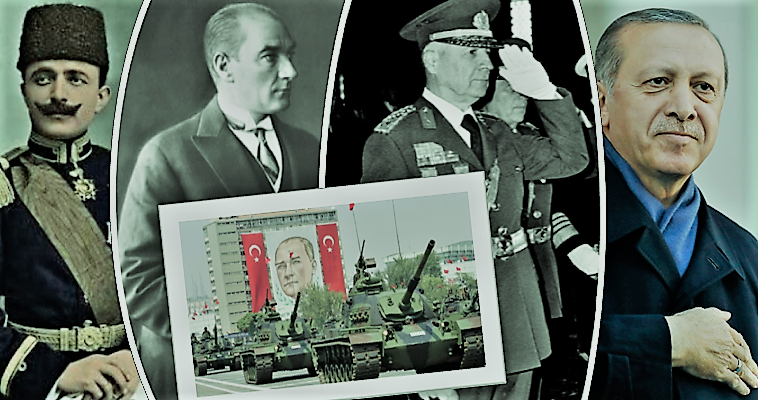Dimitris Chatzidimitriou: Why the Turkish armed forces are a pillar of neo-Ottomanism
26/06/2020
It comes as a surprise that Greek observers of Greek-Turkish relations have noted, in surprise, that in recent months “the Turkish armed forces has been at the forefront of planning and rhetoric, and the Foreign Ministry has been relegated to a secondary role,” as the head of one of the oldest and most famous think tanks in Athens said in a radio interview a few hours ago
The only thing that can be gleamed from such observations is the poor monitoring of Turkish affairs and the lack of knowledge of realities inside Turkey. Turkey is one of those countries that has fully incorporated into its international relations the notion that “foreign policy choices are not just about diplomatic ways to deal with problems, but also about the use of force” (Bulent Tanner, professor of Law at the University of Constantinople, 1994).
In this context, not only rhetoric but also demonstration, at every opportunity, of “hard power” – as shown by Turkey’s armed involvement in its immediate geographical perimeter, but also thousands of kilometers away – is a constant component of foreign policy. of Ankara.
- Assigning the role of “first fiddle” to the Minister of Defense, Ankara seeks to:
- Strengthen the message and threat of “hard power” towards its neighbors.
- To homogenize its political discourse, discouraging pluralism.
- Achieve and strongarm consensus within the country.
- To control the criticism of the decisions of the president and the leadership team, keeping the fear of legal action active.
In a way that is not easily understood in Western democracies, “in Turkey the concepts of foreign policy and political defense and security are almost identical. This identification becomes more visible in conditions of international tension, in which case the dividing lines concerning the areas of foreign policy and national security policy cease to exist “(Gencer Ozkan, Marmara University).
It is precisely from this perception that the decisive role – even in the revised by Erdogan constitution – of the Turkish National Security Council (SEA) is derived and is legitimized, in the context of which what is said by its military members is a factor of special importance.
What does “national security” mean for Turkey?
In Turkey, the term “national security” is so broad that it covers almost every aspect of social life, with obvious implications for the functioning of the rule of law, as evidenced by the ongoing persecution of dissidents four whole years after the grotesque coup of July 15-16, 2016.
It is an internal condition that fully serves Recep Tayyip Erdogan, who used EU pressure, in the early stages of his political rule, not to adapt Turkey to the Copenhagen criteria, but to upset the balance of power, within the power complex and deep state in his country.
While the July coup of 2016 seems to have changed everything. It seems like a rift with Kemalism and its precepts, as the military seems to be catching up with the country’s Ottoman past, colluding with Erdogan and his neo-Ottoman bigotry. The presidency of the SEA (meets more regularly than the cabinet) only seems to be strengthened and emphasized in times of crisis, as the “Memorandum on the definition of national foreign policy” remains unchanged and in full force, as it was published in the the late 1990s by the SEA General Secretariat.
According to this, “the formulation of a national foreign policy is a matter that requires thorough research and careful evaluation of international political phenomena and circumstances. It also requires cooperation and coordination within the existing administrative system, while secrecy, specialized knowledge and speed are required, so that these serious issues are not exposed to pressure from political circles and groups. ”
The primacy of the armed forces
As the Turkish General Staff Chief put it in other words, in December 2005, “if the issue of Turkey’s European accession passes through the institutional deconstruction of the country itself, then Turkey must, first and foremost, safeguard its interests.” .
But when policy-making and foreign policy decisions are formally only the work of the legislative and executive branches of government and “national security” is understood as a situation that affects all aspects of society, it seems almost normal for the armed forces, according to the norms and workings in Turkey, to take a leading role in a way unthinkable for a Western Republic.
Thus the statement of General ret. Hilmi Ozkiok (Chief of General Staff 2002-2006), that “no one has the right to judge or bring to trial institutions such as the armed forces. Only history has that right.” was considered perfectly normal, and as such was accepted by the Turkish citizens and politicians,





